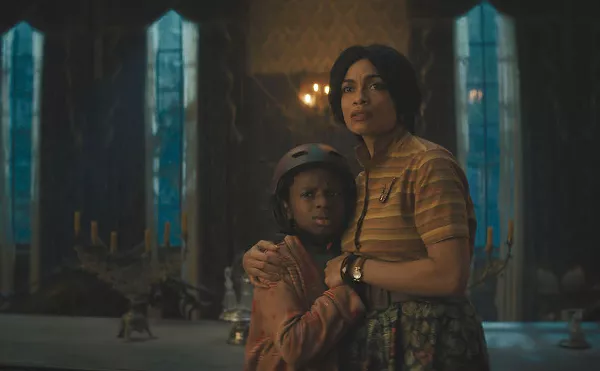It's based on a novel by Donald Goines, the popular African-American writer ("America's #1 best selling black author," if you believe the book's cover) whose books mirrored his life in and out of prison and drug addiction until his untimely murder at the age of 39 -- Never Die Alone was written in 1974, the year of his death. Shot in eighteen days on the dark streets of downtown L.A. using mainly available light, the film has a gritty, grainy look that matches the book's raw texture and keeps the violence and drug abuse from ever looking slick or appealing.
Goines' story splits its timeline neatly in two. The odd-numbered chapters focus on failed writer Paul (played here by David Arquette), who offers kindness to dying drug dealer King David (DMX) and in return receives his car, money and memoirs, through which we learn what led up to his murder. The even-numbered chapters deal with the aftermath of the killing, as gunman Mike (Michael Ealy, of both Barbershop films) is betrayed by crime kingpin Moon (Clifton Powell), who had requested the hit in the first place.
Such a structure could very easily be overly complicated on the big screen, and thus first-time screenwriter James Gibson (who's also working on a Crow sequel set to star DMX) saves us any significant time fragmentation until the film's second half. Following the introductory scene of David in the coffin, we go back in time two days, see his murder, tie Paul to the action more significantly and then, some 45 minutes in, have Paul start listening to David's audio journal, thereby introducing flashbacks to the man's prior life. One wonders if perhaps a more linear screen structure would work better.
Split timelines aside, Gibson has remained true to the spirit of Goines. There are inevitable updates, including a Tupac joke, and Arquette is younger than his character was originally written, but all the new dialogue fits in with the old (though the NY-L.A. characters still smoke in bars). Goines often intended his stories as wake-up calls to the world, yet they don't feel dated in the least, which is equal parts to his credit and to society's shame. Then again, they were telling stories like this in the 1920s too: Yesteryear's tommy-gun wielding bootleggers were the predecessors of today's gat-slinging coke dealers.
One curious addition that doesn't quite jell, however, is the addition of a scene between Paul and his girlfriend (Aisha Tyler), during which it becomes clear that the alcoholic writer is living in a run-down apartment in the inner city because he chooses to, not because he has to. Implicit in the scene is the possibility that Paul is only dating this black woman for street cred -- earlier we've seen Wu-Tang Clan posters and Boondocks cartoons taped to the walls of his one-room residence. This makes Paul a more potentially dubious individual for no obvious narrative reason. Being an alcoholic failure isn't enough of a character flaw?
One minor casting quibble, too: Though some artistic license is certainly permissible, having the five-foot-eleven DMX play a man written as significantly shorter and older (the gray-hair effect the rapper sports doesn't quite cut it) is odd, and someone wasn't paying attention when they cast Antwon Tanner as Mike's best friend Blue. Blue is supposed to be so named for his ultra-dark skin color, but Tanner might be better named, uh...Tanner. As in "tanner than Arquette, slightly."
Those objections aside, however, Never Die Alone injects some much-needed energy into the oeuvre of director Dickerson (needed following the deadly dull Snoop Dogg horror flick Bones) and forces DMX to flex more than just his shirtless pecs, stretching him as an actor (though his extended death scene could still use a bit more work). Cinematographer Matthew Libatique previously revived Joel Schumacher's credibility with Tigerland, and he and Dickerson come up with some nicely inventive shots.
Moral scolds will undoubtedly decry this as just another violent rap movie, but much like that Jesus flick they're all digging, this is a movie that shows the harsh consequences of sin -- that the victims are seldom innocent makes their karmic punishments no less harsh on the senses. Also, there isn't much rap in the movie -- two DMX songs over the end credits and that's about it.
If you're looking for the book at your local Borders, just a friendly heads-up: You won't find it in the mystery/thriller section, nor the true crime section. Rather, it's been "ghetto-ized," if you will, to a small, hard-to-find section labeled "African-American fiction." Much of said section is filled with Goines books, so if Never Die Alone turns a tidy profit, look for some inventive entrepreneur to start thinking franchise.





